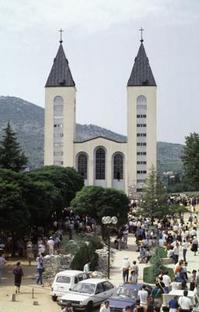 (Translated from the German-language Catholic newspaper Die Tagespost. Thanks to reader budapestinensis for spotting a translation error on my part. The corrected word is marked in red below.)
(Translated from the German-language Catholic newspaper Die Tagespost. Thanks to reader budapestinensis for spotting a translation error on my part. The corrected word is marked in red below.)
(UPDATE 2/9: A Dutch translation of the interview is now available on-line at In Caelo et In Terra.)
(UPDATE 2/18: Translations into other languages are welcome. Bienvenidos, lectores de Panorama Católico internacional.)
(UPDATE 2/22: Fr. Hauke has responded to critics from the Medjugorje movement.)
The Medjugorje phenomenon and the discernment of spirits: a conversation with dogmatic theologian Manfred Hauke
For years there has been discussion of the phenomenon of the alleged "Marian apparitions" that took their origin in Medjugorje: Does the Mother of God really appear to the seers who originated in Medjugorje? Or are the experiences parapsychological fruits of the seers' unconscious? Are they a deceptive manipulation or even a trick of evil forces? According to reports, there are plans at the Vatican to have the Medjugorje phenomenon conclusively investigated by a commission. Regina Einig asked the chairman of the German Society for Mariology (Deutsche Arbeitsgemeinschaft für Mariologie), professor of dogmatics and patristics at Lugano, Manfred Hauke, about the subject.
Wherein can we find the theological meaning of Marian apparitions?
Appearances of the Mother of God belong to the charism of prophecy, in which the mysterious working of the Spirit of God comes to expression. St. Paul emphasizes: "Do not quench the Spirit! Do not despise prophetic utterances!" (1 Thess. 5:19-20). The book of Proverbs already emphasizes: "Without prophecy, the people become demoralized" (Prov. 29:18). According to Thomas Aquinas, prophetic revelations after the Apostolic era are not given in order to spread a new teaching of faith, but serve to guide human action. Theology speaks here of "private revelations", inasmuch as the content conveyed does not belong to general and public revelation, which closed with the Apostolic era. "Private", then, means a reference to an individual person, a group or even the whole Church in a particular historical situation. "Private revelations", or (better) prophetic revelations help us to recognize the "signs of the times" (Lk. 12:56) and act accordingly. Following Pope Benedict XIV, the recognition of a private revelation by the responsible bishop is not the basis of any duty to believe, in the strict sense (fides divina), but it states that one can approach the apparitions with a purely human faith (fides humana) based on reasoning. So no Catholic is obliged to believe that the Mother of God appeared in Lourdes and Fatima; but the Church states that the reports of the apparitions are worthy of belief and a Catholic may believe in them and cultivate a corresponding spirituality. Yes, the Church has even set several memorial days in the liturgical calendar and issued corresponding Mass formulas. Prophetic revelations are not the normal case of Christian life, but an exception: "Blessed are they who do not see and yet believe" (Jn. 20:29). The Catechism of the Catholic Church stresses with St. John of the Cross: In Jesus Christ, the eternal divine Word, God the Father has shared everything with us (cf. Hebr. 1:1-12). "Any person questioning God or desiring some vision or revelation would be guilty not only of foolish behavior but also of offending him, by not fixing his eyes entirely upon Christ and by living with the desire for some other novelty" (CCC 65).
